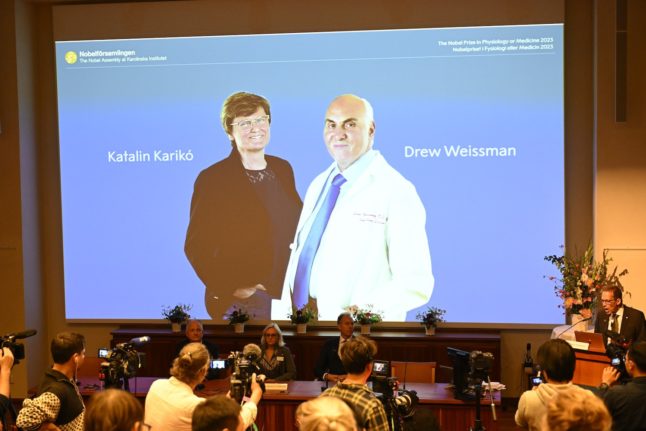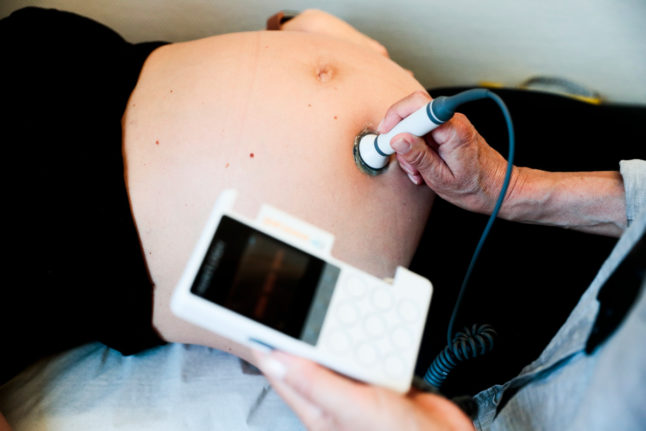The pair, who had been tipped as favourites, “contributed to the unprecedented rate of vaccine development during one of the greatest threats to human health in modern times”, the jury said.
The World Health Organization declared Covid a pandemic in March 2020 and the mRNA vaccines were approved for use in December that year. Billions of doses have been injected around the world since then.
Together with other Covid vaccines, they “have saved millions of lives and prevented severe disease in many more”, the jury said.
Karikó, 68, and Weissman, 64, longstanding colleagues at the University of Pennsylvania in the United States, have won a slew of awards for their research.
They include the prestigious Lasker Award in 2021, often seen as a precursor to the Nobel.
In honouring the duo this year, the Nobel committee in Stockholm broke with its usual practice of honouring decades-old research, after ensuring it has stood the test of time.
While the prizewinning research dates back to 2005, the first vaccines to use the mRNA technology were those made by Pfizer/BioNTech and Moderna against Covid-19.
Unlike traditional vaccines which use weakened virus or a key piece of the virus’ protein, mRNA vaccines provide the genetic molecules that tell cells what proteins to make, which simulates an infection and trains the immune system for when it encounters the real virus.
Sweet comeback
The idea was first demonstrated in 1990 but it wasn’t until the mid-2000s that Weissman and Karikó developed a technique to control a dangerous inflammatory response seen in animals exposed to these molecules, opening the way to develop safe human vaccines.
The honour is particularly sweet for Karikó, the 13th woman to win the Medicine Prize, who toiled in obscurity for years and struggled to convince her superiors of the need for research on “messenger ribonucleic acid”.
Speaking to Swedish Radio (SR), she said her late mother always had faith in her, listening to the Nobel prize announcements “year after year” in the hopes of hearing her daughter’s name called out.
“Unfortunately, five years ago she passed at the age of 89. She might be listening from above,” Karikó said.
Thomas Perlmann, the secretary general of the Nobel Assembly, called Karikó “an extraordinary and unusual scientist” who “resisted any temptation” to do “something easier”.
Weissman told SR he heard the news from Karikó, who received the call from the jury first.
“We weren’t sure if somebody was playing a prank on us,” he said, adding that he would “probably go out with my family and have a nice dinner” to celebrate.
In the 1990s, Karikó believed mRNA held the key to treating diseases where having more of the right kind of protein can help — like repairing the brain after a stroke.
But the University of Pennsylvania, where Karikó was on track for a professorship, decided to pull the plug after the grant rejections piled up.
Breakthrough
Much of the scientific community was at the time focused on using DNA to deliver gene therapy but Karikó believed that mRNA was also promising since most diseases are not hereditary and don’t need solutions that permanently alter our genetics.
First though, she had to overcome the problem of the massive inflammatory response in animal experiments, as the immune system sensed an invader and rushed to fight it.
Karikó and Weissman discovered that one of the four building blocks of the synthetic mRNA was at fault — and they could overcome the problem by swapping it for a modified version.
They published a paper on the breakthrough in 2005. Then, in 2015, they found a new way to deliver mRNA into mice, using a fatty coating called “lipid nanoparticles” that prevent the mRNA from degrading and help place it inside the right part of cells.
Both these innovations were key to the Covid-19 vaccines developed by Pfizer/BioNTech and Moderna.
Their mRNA technology is now being used to develop other treatments for diseases and illnesses such as cancer, influenza and heart failure.
The pair will receive their Nobel prize, consisting of a diploma, a gold medal and a 11 million kronor cheque (around one million dollars), in Stockholm on December 10.
The Nobel will however not be the first gold medal in Karikó’s family. Her daughter Susan Francia is a two-time Olympic gold medallist rower.



 Please whitelist us to continue reading.
Please whitelist us to continue reading.
Member comments